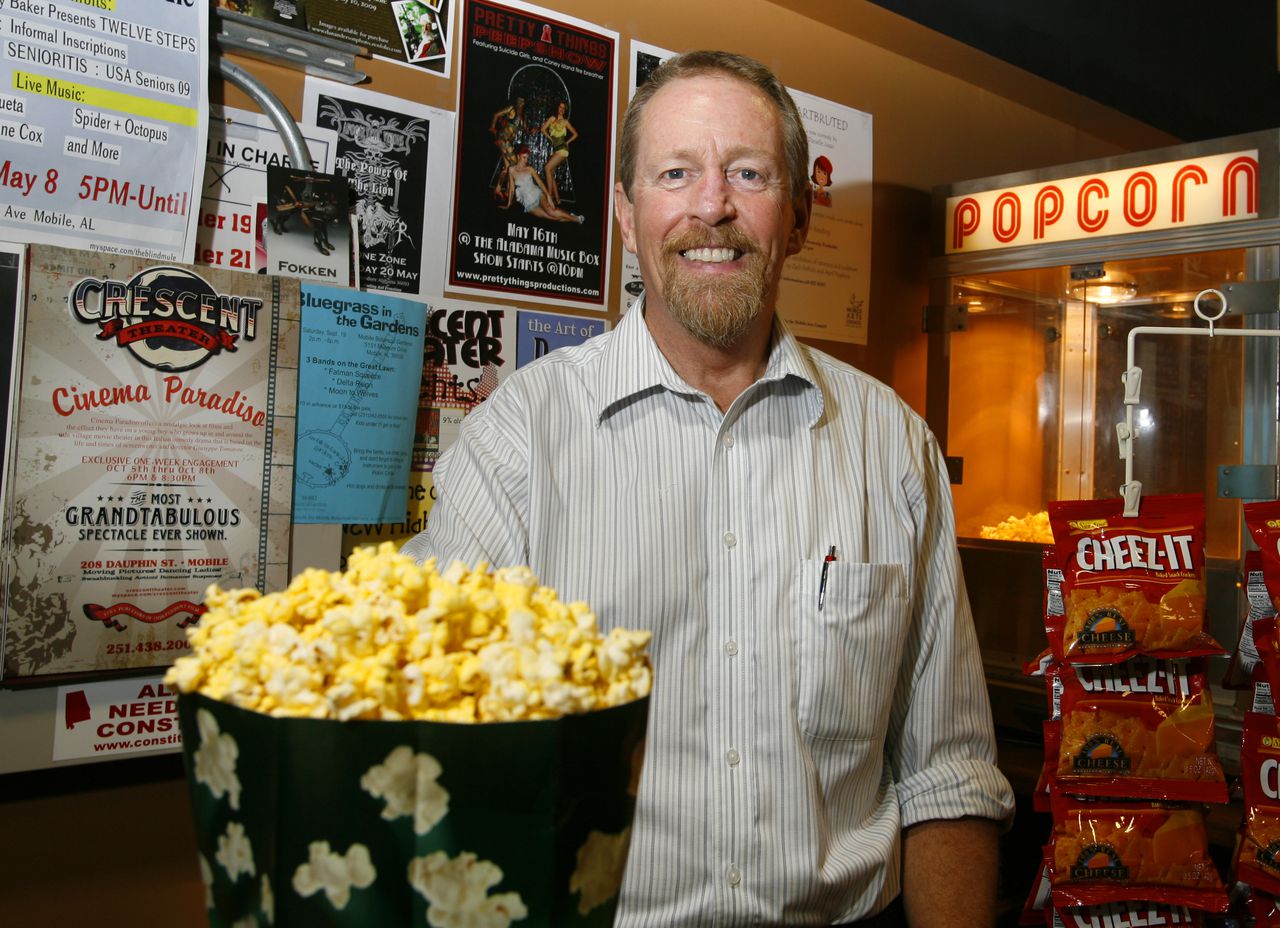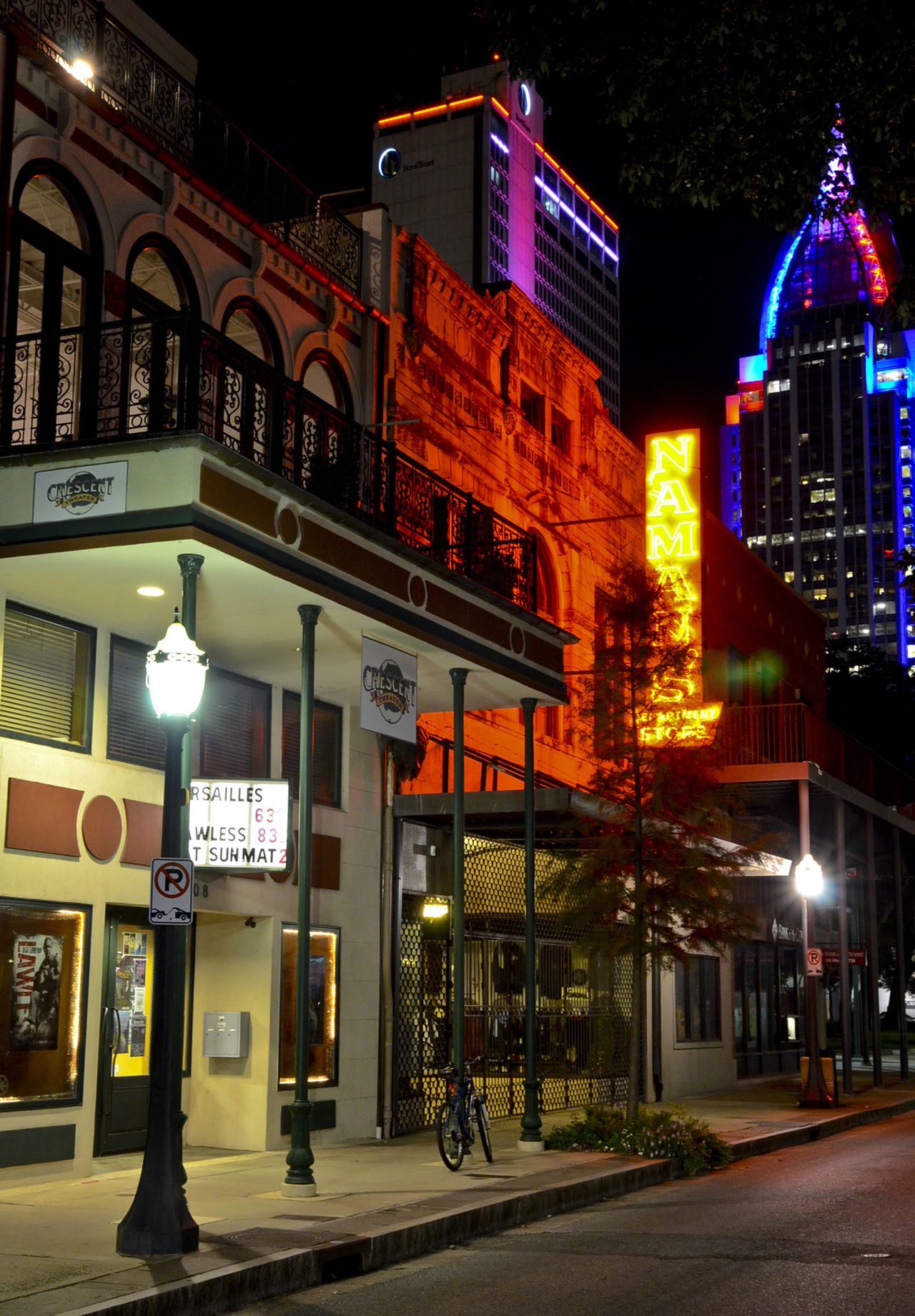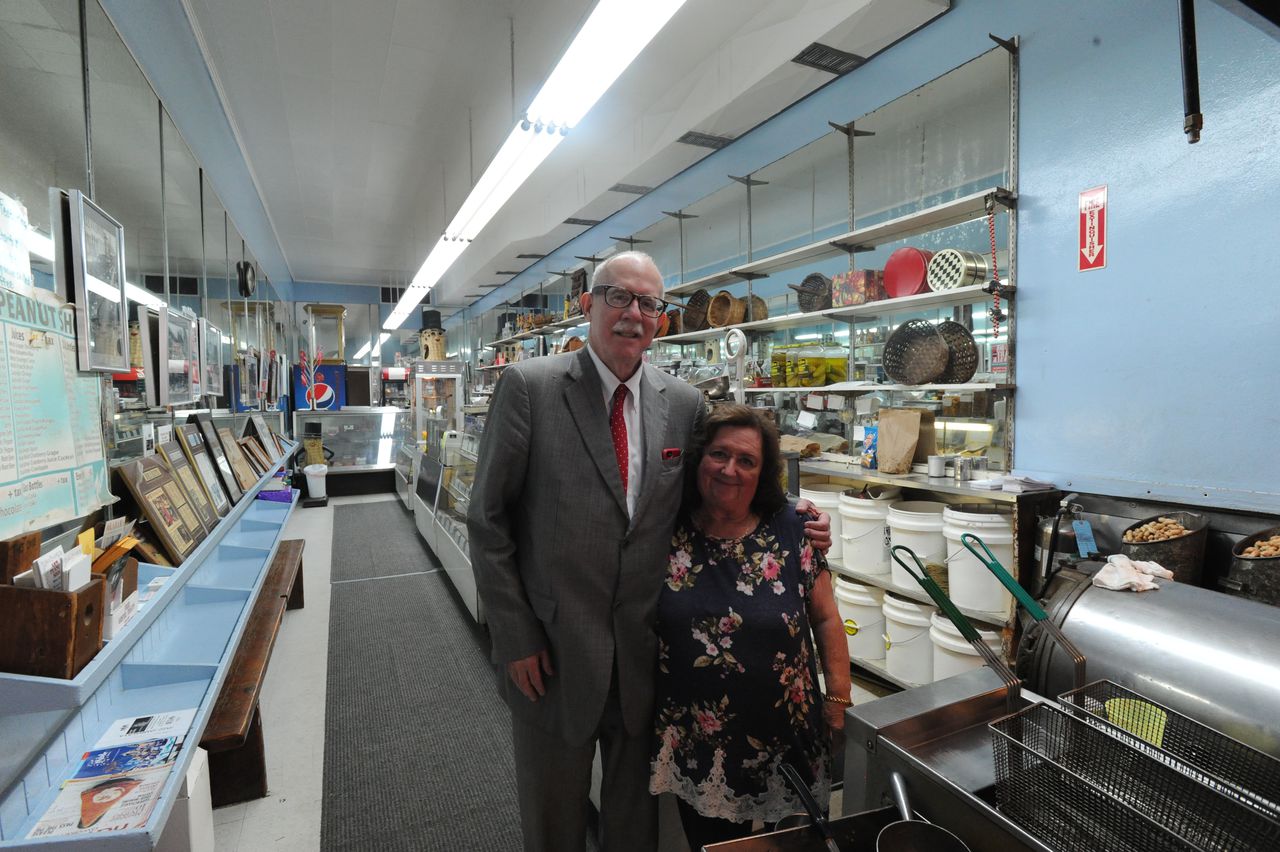‘I guess that’s it’: Barring a last-minute miracle, Mobile’s Crescent Theater is gone
Downtown Mobile’s Crescent Theater has been dark since a March 24 screening attended by a lone viewer, and barring the arrival of a white knight with about half a million dollars in hand, it appears the beloved venue’s 14-year run is over.
The single-screen, independent Crescent has had its share of crises since owner-operator Max Morey launched it in 2008. The nonprofit Crescent Theater Film Society was formed just a couple of years later to supplement its operations with donations and grants. In 2012, it took an $85,000 Kickstarter drive to provide the projection equipment the four-year-old theater needed to survive the industry’s inexorable transition from film to digital. In 2017, Morey issued an online call for $72,000; the drive’s success guaranteed the theater could keep going for another two years. In 2020, the Film Society raised $20,000 via GoFundMe to offset the impact of the COVID-19 pandemic.
Like a cat, the venue always seemed to have another life left in it. In September 2022, however, the Film Society announced that the Crescent would be closing at the end of the month because the theater’s rent, which ticket sales and donations had barely kept covered, was about to increase steeply.
That prompted an effort by attorney Buzz Jordan and other potential investors to try to piece together a deal to purchase the property occupied by the Crescent. Not the whole three-story building at 208 Dauphin St., but the first floor containing the approximately 100-seat theater.
For the next few months, it appeared to be business as usual. In retrospect, that might have just been the time it took the last few grains of sand to run out of the venue’s hourglass. The day that probably was the Crescent’s last came and went with no fanfare, no last-minute pleas for donations. It was followed by the slow spread of awareness that the doors hadn’t been open for a while.
“I guess that’s it,” Morey said late Monday. “Coca-Cola’s on the way tomorrow morning to pick up the coolers. I think that’s it.”
Morey expressed frustration with the way negotiations had gone. So did John Switzer, the building’s Pensacola-based owner. So did Jordan.
“I made an offer, it was rejected, that’s all I could do on my end,” said Jordan.
Note: Jordan isn’t a newcomer at this. He previously bought another downtown landmark, the A&M Peanut Shop across the street from the Crescent. So he’s got experience running a legacy business whose fortunes are tightly linked to the ebb and flow of downtown life. “As downtown Mobile goes, the Peanut Shop goes,” he said. “I’m happy with it.”
Mobile attorney Buzz Jordan stands with Deborah Gibson DeGuire inside the A&M Peanut Shop in downtown Mobile. Jordan recently struck a deal to buy the shop, a landmark in downtown Mobile since the 1950s, from DeGuire.
“I like Buzz, I thought Buzz made a strong effort, I think people didn’t want to support Buzz, I guess. I don’t know,” said Switzer. “But it’s going to be a sad day when that movie theater does close.”
Some of the points of dispute in play during the last six months sound like any real-estate negotiation: Fussing over offers and counter-offers, disagreeing on whether the AC needs an upgrade, trying to negotiate how building fees factor into a sale price, getting an appraisal and so on. But for Switzer, there’s a particular sticking point: He hasn’t collected any rent on the theater since the end of September, he said, and if the Crescent is going to continue, he wants $18,000 in back rent. So as negotiations have gone on, month by month, the price has gone up.
Switzer remains disgruntled by the Crescent Theater Film Society’s announcement back in September that the theater would have to close because the landlord was doubling the rent. He was raising it from $3,000 to $5,000, he said, so “doubling” was an exaggeration. And the jump, he said, was just bringing it up to fair market value.
“I tried everything in my power, that I was able to do, to keep that theater open, but I was constantly losing money, and bleeding, and hemorrhaging,” Switzer said. “They had been paying only $12 a square foot for the last four years, the Film Society. And the average square footage cost for commercial property in downtown Mobile is $18. They’ve been getting a sweet deal for the last 14 years. And of course, that sweet deal, I was their biggest donor. I was their biggest charitable donor and yet I got treated like a red-headed stepchild.”
“I had to borrow to pay my property taxes on that building,” he said. “Those rents normally would have covered a portion of those property taxes due in December.”
Hunter said that property rates can vary a lot from one type of business to another, so an average might be misleading. But she said she agrees without a doubt that Switzer deserves credit for keeping the rent below market value, particularly in recent years.
“He is not a bad guy for wanting to get as much rent as he can for his property,” she said. When he decided last fall that he had to hike the rent, she said, the price was too high for the Film Society, which opted not to renew its lease. Switzer’s decision to let the theater operate for months after that, rent-free, as negotiations continued was “remarkable,” she said.
Switzer has divided the building into three units subject to separate sale, condo-style, but says he’d happily take $1.805 million for the whole thing. At the moment, the upper residential floor is being rented; and the second floor, also residential, is under contract.
The magic number for the commercial space on the first floor is $540,000, he said, implying there was a little room for negotiation but not a lot. He’d had a couple of offers, he said – one from someone who wanted to operate a theater, one from a party who had other plans – but that neither had come to fruition.
Morey said he’d give the Crescent, meaning ownership of the business and equipment, to anyone who could afford the space.
“It’s doable,” he said. “If you buy the first floor, you get the movie theater for free.” (Once catch: You’d probably have to agree to keep Morey and his staff on board, at least for a while.)
Switzer said that April 18 is the day when he’ll tell Morey it’s over and the theater fixtures have to go. Morey will then have until the end of the month to remove them. Switzer would be as pleased as anyone to see a buyer emerge, he said, and he thinks a theater could do well in the space.
Morey, whose passion for movies has been on display in everything the Crescent has done for 14 years, certainly feels that way. He remains bullish despite everything: The transition to digital, the rise of streaming services, the impact of the pandemic.

Max Morey has been a fixture at the Crescent Theater, sharing his passion for movies with patrons for 14 years. (Press-Register, Mary Hattler)Press-Register
“Let me say this,” he said. “The future for movie theaters is huge. There was around 5,000 screens [in the nation], there’s 3,000 now … But the future is beautiful for movie theaters.” The major studios are re-committing to putting quality movies in theaters, he said, so there’s more product in the pipeline.
“There is content out there,” he said. “Including Wes Anderson’s movie and Harrison Ford in ‘Indiana Jones’ and this movie ‘Air.’ The future looks wonderful for movie theaters. If anybody wanted to come in, they could really make a nice bundle in the future.”
“The studios are putting their movies back in theaters,” he said. “That’s a fact.”
“We were considered one of the most successful single-screen theaters in the nation,” Morey said. “By the studios, not by me. We made as much money as any other theater in town because of our patrons.”
“Thank you for the run, thank you Mobile,” he said.
Hunter said she’s still trying to come to terms with what the loss of the Crescent might mean for downtown. Its opening certainly had a powerful impact, she said.
“It has meant everything to downtown,” she said. “Fourteen years ago when they opened, there was no happy-hour scene.” People finished work and went home, she said, leaving little activity until the late-night scene fired up hours later.
The Crescent’s daily screenings provided a reason, rare at the time, to be downtown at 6 p.m. That became the seed of something that grew, Hunter said. Now you could have dinner or drinks before or after a movie. There was “an anchor for that shoulder time of day.”
“Slowly you saw a transition into that after-work scene,” she said. “It was very slow at first, but it grew.”
“I don’t know what the impact will be if it’s gone,” she said. “I haven’t really faced it.”
Hunter said that around 700 donors have contributed to the theater over the years. For many of them, she said, the Crescent wasn’t just a place to go, it was the hub of a community. “They’re devastated,” she said.
She’s trying to remain hopeful, she said. “You know, downtowns are always in transition,” she said. “They’re dynamic places. … There’s always something new.”
The Crescent’s website still lists Coming Attractions that might have been. “Air,” a Ben Affleck film dramatizing the culture-changing union of Nike and Michael Jordan. “Somewhere in Queens,” comedian Ray Romano’s directorial debut, with a cast that includes fellow comedian Sebastian Maniscalco. “Book Club: The Next Chapter,” in which Diane Keaton, Jane Fonda, Mary Steenburgen and Candice Bergen go to Italy; “About My Father,” a comedy that Maniscalco filmed in Mobile with Robert De Niro. And yes, “Indiana Jones and the Dial of Destiny.”

The Crescent Theater is seen in downtown Mobile on Sept. 11, 2012. (Michael Dumas/AL.com)Michael Dumas
Those are might-have-beens. The Crescent’s last reel was something else.
Morey said that on March 24, the day Switzer told him he had to shut the doors, the Crescent was due to start a run of “The Lost King.” It’s the dramatization of a true story about an amateur historian’s efforts to find the burial site of King Richard III, which lead to a dig that finds his remains under a parking lot.
“It was in the projector, we had sold tickets,” said Morey, who then goes off on a classic Max Morey rhapsody: “The movie’s lovely, Steve Coogan and Sally Hawkins, and we waited and waited – I called IFC, that’s the studio, I called them almost a year ago and yeah, they said, ‘You can play it, Max, but we don’t know when we’re going to release it.’ And we waited a year and got it.”
And he had to close the doors. “So I closed them, but I was on the inside, and I sat in the front row and watched a movie by myself for the first time in 15 years and cried all the way through it,” he said. “I went and got a dispenser, a napkin dispenser. I’m eating my own popcorn and soda, crying my eyes out, and a wonderful movie by the way, stunning movie, and that was the end of it, that was the last movie we played, me sitting in there watching it. I mean, I went through the whole box [of napkins]. Very emotional. Very emotional. Big chapter in my life. Wonderful chapter.”
